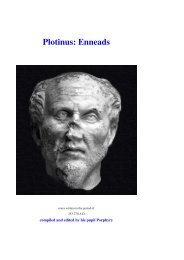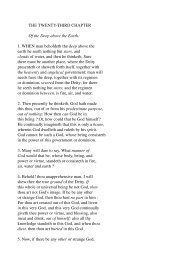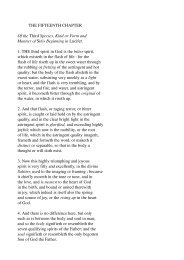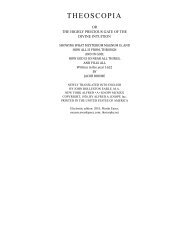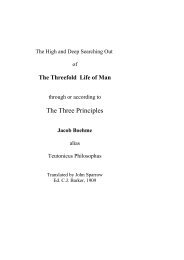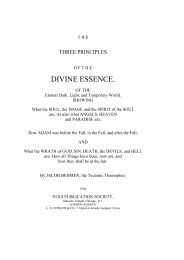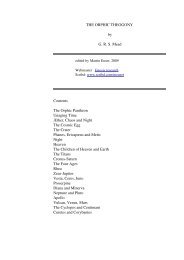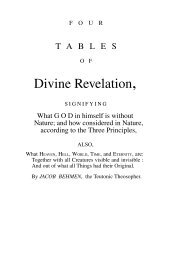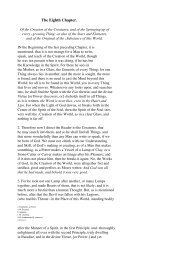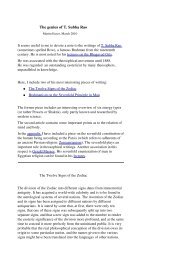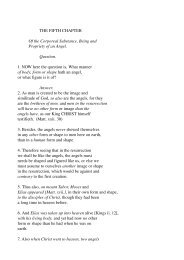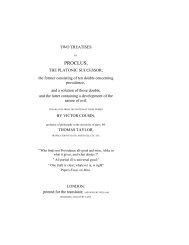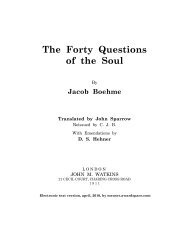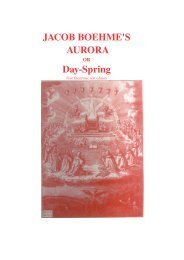Gerald Massey's Lectures - Society in evolution - Awardspace
Gerald Massey's Lectures - Society in evolution - Awardspace
Gerald Massey's Lectures - Society in evolution - Awardspace
You also want an ePaper? Increase the reach of your titles
YUMPU automatically turns print PDFs into web optimized ePapers that Google loves.
Paul, that would positively prove the re-birth for a future life, and constitute the<br />
revelation of his Messianic mystery. Paul's Christ, the Lord, is the spirit; his gospel is that<br />
of spiritual revelation, the chief mode of manifestation be<strong>in</strong>g abnormal, as it was, and had<br />
been, <strong>in</strong> the Gnostic mysteries.<br />
The Gnostic Christ was the Immortal Spirit <strong>in</strong> man, which first demonstrated its existence<br />
by means of abnormal or spiritualistic phenomena. It did not and could not depend on any<br />
s<strong>in</strong>gle manifestation <strong>in</strong> one historic personality. And when Paul says, "I knew a man <strong>in</strong><br />
Christ," we see that to be <strong>in</strong> Christ is to be <strong>in</strong> the condition of trance, <strong>in</strong> the spirit, as they<br />
phrased it, <strong>in</strong> the state that is common to what is now termed mediumship.<br />
Be<strong>in</strong>g <strong>in</strong> the trance condition, or <strong>in</strong> Christ, as he calls it, he was caught up to the third<br />
heaven, and could not determ<strong>in</strong>e whether he was <strong>in</strong> the body or out of the body. Here he<br />
identifies his Christ with a condition of be<strong>in</strong>g, and that condition with the abnormal<br />
phenomena known to some of us who have studied Modern Spiritualism. This is the<br />
Gnostic Christ, not the Christ of any special historic personality, who is supposed to have<br />
manifested only once upon a time, and once for all. The Christ of the Gnosis, of Philo and<br />
of Paul preceded Christianity, and is sure to supersede it, because it is based upon facts<br />
known <strong>in</strong> nature and verifiable to-day. It was those who were entirely ignorant of those<br />
subtle and obscure facts, unfolded <strong>in</strong> the Mysteries, who became Christians <strong>in</strong> the modern<br />
sense, and believed, because they were bl<strong>in</strong>d. Paul was both a Seer and a Knower. He<br />
became one of the public demonstrators of the facts, just like any it<strong>in</strong>erant medium of our<br />
time. He says to the Galatians: "Ye know that because of an <strong>in</strong>firmity of the flesh, I<br />
preached the gospel unto you the first time, and that which was a temptation to you <strong>in</strong> my<br />
flesh, ye despised not nor rejected (or spat out); but ye received me as an angel of God, as<br />
Christ Jesus!" This <strong>in</strong>firmity of the flesh was his tendency to fall <strong>in</strong>to trance. When it first<br />
occurred, at a given date, he received his revelation and began to preach his own gospel.<br />
He talked and taught as do the mediums <strong>in</strong> trance to-day. He received his revelations-visions<br />
and revelations of the Lord--and gave proofs of the Christ, or spirit, speak<strong>in</strong>g<br />
with<strong>in</strong> him, speak<strong>in</strong>g through him, when he was <strong>in</strong> trance. And on this ground they<br />
received him as an angel of God--they received him as the Christ. This Christ, personated<br />
by Paul as the revealer <strong>in</strong> trance, was of necessity the Gnostic Christ, the Spirit of God, as<br />
he often calls it, the Christ that spoke through him, founded on what is now termed spirit<br />
control, but not based on the spirit of any Jesus of Nazareth. His Christ is the spirit which<br />
revealed itself abnormally <strong>in</strong>, and through him, so that he "spoke the wisdom and the<br />
words which the spirit teacheth; he spoke mysteries <strong>in</strong> the spirit." His Christ was the<br />
same spirit that "hath a diversity of work<strong>in</strong>gs" <strong>in</strong> various spirit manifestations. "To one it<br />
gives the word of wisdom; to another, the word of knowledge; to another, faith; to<br />
another, gifts of heal<strong>in</strong>g; to another, miraculous powers; to another, prophesy; to<br />
another, see<strong>in</strong>g of spirits; to another, the gift of tongues, and to another, their<br />
<strong>in</strong>terpretation." And as this was the Christ, that always had been so manifested, noth<strong>in</strong>g<br />
depended upon any historical character. All that was real, that is, spiritual, would be the<br />
same afterwards as it had been before. Noth<strong>in</strong>g did depend on it, and historical<br />
Christianity itself is but a vast <strong>in</strong>terpolation, the greatest of all obstacles to mental<br />
development and the unity of the human race.<br />
One more illustration that Paul was outside the r<strong>in</strong>g of conspirators who were the<br />
founders, as forgers, of Historic Christianity <strong>in</strong> Rome, and I shall have done.<br />
The Christ proclaimed by Peter and James was the mythical Messiah of the Time-cycles,<br />
the ever-com<strong>in</strong>g one, converted <strong>in</strong>to an historical character; hence he who was supposed<br />
to have just come still rema<strong>in</strong>ed the Com<strong>in</strong>g One. He himself is made to say that he is<br />
com<strong>in</strong>g before the then present generation shall have passed away.<br />
Apart from the mythos and its mean<strong>in</strong>g, there was no other com<strong>in</strong>g, or end of the Times,<br />
of the age, Æon, or world! The Kronian allegory can only apply to the Kronian Christ, as<br />
the metaphorical manifestor of the Eternal <strong>in</strong> the sphere of time, who could neither be



